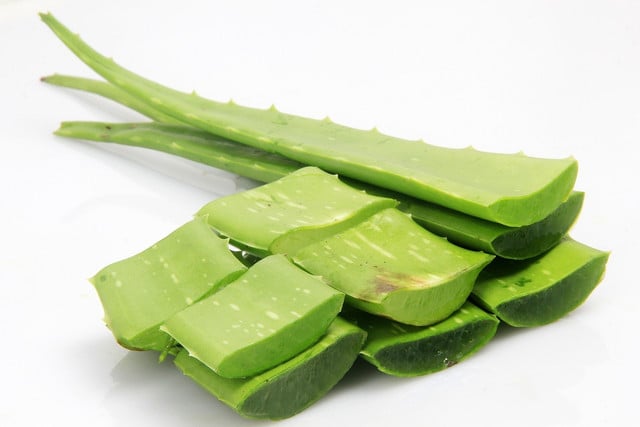
Aloin is primarily known as a medication for constipation. You can find out exactly how the herbal substance from aloe vera works and what side effects aloin has here.
Aloin is a substance that can be extracted from all types of aloe vera. To do this, the aloe vera gel is first pressed from the leaves of the plant. The bitter-tasting, yellow aloe juice, which contains aloin, is then extracted from the outer parts of the leaves.
Aloin is an effective remedy for constipation, as it is responsible for the laxative effect of aloe vera juice. The fact that aloe vera also supports wound healing and helps with sunburn, for example, is not due to aloin, but to the glycoproteins and aloenins it contains.
What is aloin?
According to the European Medicines Agency, aloin is considered an effective laxative for short-term constipation. This effect is due to the so-called anthranoids contained in the plant juice, which stimulate intestinal activity. Doctors also assume that they increase the volume of fluid in the intestine and thus ensure a softer consistency of the stool.
Due to the possible side effects, you should only use aloin if other home remedies do not work (sufficiently). You can find out which more tolerable remedies also combat constipation here: 4 effective home remedies for constipation.
According to the recommendations of the European Medicines Agency, aloin is only suitable for adolescents and adults aged 12 and over. You should also not take it for longer than a week. Follow the instructions for use on the medication’s package insert. Use pills or tinctures from the pharmacy and avoid buying aloin from dubious online shops. It is usually sufficient to take aloin two to three times a week. If the constipation has not improved after this period or has even worsened, you should seek medical advice.
Undesirable side effects of aloin

(Photo: CC0 / Pixabay / alsampang)
If you use aloin for longer than a week, there is a risk that the active ingredient will upset your water and salt balance. This can lead to a drastic electrolyte and fluid deficiency, which impairs your heart function and leads to muscle weakness, according to Netdoktor.
Such a deficiency may manifest itself in large amounts of blood and protein being excreted in the urine. A slightly reddish color of the urine is still harmless. If the color is more intense, you should interrupt the aloin therapy and seek medical advice.
According to Netdoktor, a short-term overdose of the active ingredient can lead to gastrointestinal cramps. In this case, you should definitely reduce the dose and give your intestines a longer break before taking the medication again.
Pregnant women and breastfeeding mothers should generally avoid aloin, according to the European Medicines Agency. The active ingredient is also problematic for patients who already suffer from certain gastrointestinal diseases and dehydration and should only be taken under medical supervision.
Is aloin carcinogenic?

(Photo: CC0 / Pixabay / endriqstudio)
You should avoid preparations containing aloin that are not declared as medicines but as food supplements. These may contain higher amounts of anthranoids, which, according to the Federal Institute for Risk Assessment, are suspected of being carcinogenic and mutagenic.
The exact connections have not yet been sufficiently researched. However, the outer layers of the leaves are particularly problematic. The leaf pulp or gel of the aloe vera from the inside of the leaf is free of anthranoids and therefore harmless to health.
Especially with this in mind, you should think carefully about whether you really want to use aloin for constipation or whether you would rather use other, more tolerable home remedies.
Read more on Techzle\.com:
-
Planting aloe vera: the best care tips
- Stomach-friendly food: Easily digestible food for the stomach
- Make your own aloe vera gel: Natural skin care from the garden
** marked with ** or orange underlined Links to sources are partly affiliate links: If you buy here, you are actively supporting Techzle\.com, because we then receive a small part of the sales proceeds. .